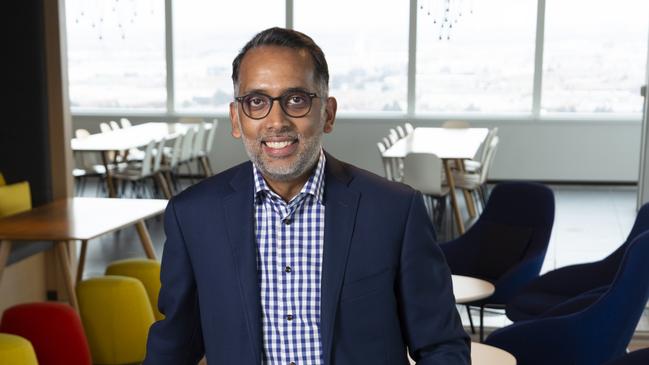Appen CEO Armughan Ahmad’s sudden departure
Ryan Kolln is Appen’s third CEO in just over a year and now has to revive the former tech darling’s fortunes following the dramatic exit of his predecessor Armughan Ahmad.

Appen chief executive and managing director Armughan Ahmad has left the company, effective immediately – two weeks after Google axed a multi-multimillion dollar contract with the company, sending shares of the one time market darling in free fall.
ASX-listed Appen – which cleans up large data sets and sells them to AI-focused companies – said Google’s move surprised them, saying it had “no prior knowledge of” the contract termination. It is a move that has further eroded investor confidence amid a series of torturous years and developments that has blasted billions of dollars from the company’s market value.
Over the past month, Appen’s share price has plummeted 45.9 per cent to 26c, wiping more than $60m off its market capitalisation. But this does not compare to the billions of dollars lost since it was trading at a peak of $35.43 a share in mid 2020.
In a brief statement to the sharemarket on Monday morning, Appen chairman Richard Freudenstein said chief operating officer Ryan Kolln would replace Mr Ahmad immediately.


Mr Ahmad is the second chief executive to depart the company in 14 months following a steep fall in its share price. Mr Ahmad’s predecessor Mark Brayan quit Appen in December 2022 after its share price had slumped 74 per cent over 12 months.
This included a 20 per cent one-day fall after Mr Brayan and Mr Freudenstein faced angry shareholders in May 2022 after Canadian IT firm Telus walked away from a $1.2bn takeover bid.
Telus tabled a $9.50 per share offer for Appen, a deal that was weeks in the making, but the company on the same day walked away from the bid, nine hours after it became public.
But Mr Freudenstein is determined to move on from the company’s woes.
“The board is excited to appoint Ryan as CEO. He has a deep understanding of Appen’s history, a strong technical understanding of the AI market, and a proven strategy background,” Mr Freudenstein said.
“This unique combination is ideal to guide Appen through its next phase and navigate the evolving generative AI market.”
Mr Freudenstein paid tribute to Mr Armughan, saying he had helmed the company during “a period of great change”.
“Having overseen a new strategic direction and re-sizing of the business, Armughan has decided to pursue new challenges. We wish him well for the future.”
Mr Kolln, who has been with Appen for more than five years, said he was “honoured” to take the wheel at the company.
“Our focus remains on supporting our existing customers to build world-class AI based applications and enabling the adoption of AI across a broad set of enterprises,” he said.
Appen’s share price sank as much as 7 per cent on the news of the chief executive handover. It finished the day down 5.4 per cent at 26c per share.
Appen was one of the so-called group of WAAAX stocks, which also included Wisetech, Afterpay, Altium and Xero.
As early as May 2019, there were concerns of a market bubble forming on the ASX, after the WAAAX share prices doubled on average in the previous 12 months.
For Appen, it was unlike a conventional tech company, in that it was essentially a contractor, providing a service to technology companies. Its performance therefore rose and fall depending on the contract cycle.
But it is the only company out of the WAAAX group to suffer a spectacular share price fall.
Mr Ahmad’s tenure as chief executive, which he performed from Toronto, Canada, began in January last year. He joined Appen after a role as a KPMG managing partner and president of digital and innovation – a role he had been in since August 2018. Prior to that, he was a senior vice president and general manager of cloud solutions at Dell. Mr Kolln is also based in North America.

A little over a week ago, one of the US’s largest tech unions warned that Google ditching Appen’s contract was the symptom of a larger issue affecting AI workers.
The Alphabet Workers Union suggested that Google’s termination of that contract showed how AI was now eating into the roles of those who had helped to develop it.
“This news should be a wake-up call for workers in the tech industry and anyone concerned about the impacts of AI on working people,” said Toni Allen, AWU executive board secretary. “As subcontractors for Google we have been a canary in the AI coal mine calling out the precarious labour conditions we face being the human workers standing between large language models and their end users.”
Its contract with Google delivered Appen $US82.8m ($125m) in revenue during the past 12 months.

Appen told investors the loss of the contract was “unexpected and disappointing, particularly considering the progress made against Appen’s transformation and performance in November and December 2023”.
The company told investors it would now “adjust its strategic priorities”, and provide a further update when it releases its financial results late next month.
“Appen continues to focus on cost management, business turnaround and delivery of high-quality AI data for its customers,” it said.
Google ditched Appen for a new supplier who could provide a more “efficient” partnership. The move is understood to be the result of a year-long review process of all of the company’s major vendors and suppliers who had worked on its search product and Bard AI product. That audit includes dozens of major suppliers across the world who provided rating work for its products, including YouTube and Google Assistant.
“Our decision to end the contract was made as part of our ongoing effort to evaluate and adjust many of our supplier partnerships across Alphabet to ensure our vendor operations are as efficient as possible,” a Google spokesman said.
The upset is just one of many to land at Appen over the past couple of years. Once one of the ASX’s strongest performers, the company has struggled amid crackdowns on consumer data and privacy, including changes on Apple iPhones that restrict how much data third-parties can collect.
Appen once rode the growing wave of AI, making a name for itself for on-selling data to companies building chatbots and AI-powered products with human-like capabilities.
It did so by paying people to complete up to 40,000 tasks per month, which included getting them to verify its machine learning models.
At one stage it faced the issue of finding enough people to do the work, then chief executive Mr Brayn told The Australian in 2018. “If there is any challenge for us, it’s finding the right amount of humans to do the work.”







To join the conversation, please log in. Don't have an account? Register
Join the conversation, you are commenting as Logout